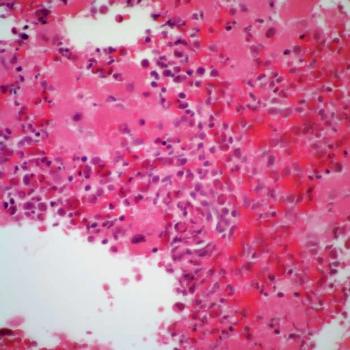
A Satellite Session, involving members from US Oncology, focused on treatment options for patients with HER2-positive metastatic breast cancer.

Your AI-Trained Oncology Knowledge Connection!


A Satellite Session, involving members from US Oncology, focused on treatment options for patients with HER2-positive metastatic breast cancer.

Jyoti S. Mayadev, MD, says that pembrolizumab in combination with chemoradiation will be seamlessly incorporated into her institution’s treatment of those with FIGO 2014 stage III to IVA cervical cancer following the regimen’s FDA approval.

Findings from the phase 3 KEYNOTE-A18 trial support the FDA approval of pembrolizumab plus external beam radiotherapy and concurrent chemotherapy in stage III to IVA cervical cancer.

177Lu-PNT2003 is a generic version of lutetium Lu 177 dotatate, which is used to treat somatostatin receptor–positive gastroenteropancreatic neuroendocrine tumors.

Ritu Salani, MD, MBA, discussed the results from the phase 2 SKYSCRAPER-4 trial, which determined tiragolumab plus atezolizumab should not be used to treat PD-L1–positive recurrent cervical cancer.

Plans have been put in place to launch a phase 1/2 study assessing NUV-1511 in a population of patients with advanced solid tumors.

Data demonstrate efficacy of robotic surgery for colectomies, which is swiftly becoming the 'preferred approach' for surgeons.

Results from the ECOG-ACRIN E4112 trial appear to support the use of DCIS scores for identifying patients with breast cancer who may be eligible to omit radiotherapy following MRI-guided surgery.

The FDA has set a Prescription Drug User Fee Act date of June 29, 2024 for SH-105 as a treatment for patients with ovarian cancer or breast cancer.

Investigators are assessing the safety and antitumor activity of rinatabart sesutecan in advanced epithelial ovarian cancer as part of the phase 1/2 PRO1184-001 study.

Results from the phase 2 KRYSTAL-1 trial led to the approval of adagrasib for patients with KRAS G12C–mutated non–small cell lung cancer by the European Commission.

A survey was conducted in Italy for survivors of gynecologic cancer regarding quality of life, specifically that of sexual activity after a cancer diagnosis.

Patients with relapsed/refractory acute myeloid leukemia appear to benefit from treatment with SLS009.
![[18F]TFB PET/CT May Predict [18F]TFB/FDG Positivity in Differentiated Thyroid Cancer | Image Credit: © Kateryna Kon - shutterstock.com](https://cdn.sanity.io/images/0vv8moc6/cancernetwork/b4ee57eff4c36f6c8244904cf57aa642e4da812c-1000x667.jpg?w=350&fit=crop&auto=format)
The predictive value of [18F]TFB PET/CT may be useful in identifying patients with differentiated thyroid cancer who may be eligible for treatment with [131I]iodine therapy.

Findings from a retrospective study highlight an increase in the use of targeted agents like ibrutinib from 1998 to 2020 for American military veterans with chronic lymphocytic leukemia.

Smita K. Rao, MBBS, MS, et al gave an overview of implementing genetic counseling into oncology practices through telemedicine.

Investigators report high response rates with pirtobrutinib in those with mantle cell lymphoma and high-risk disease features in the phase 1/2 BRUIN trial.

The FDA cannot approve the application for zolbetuximab in advanced or metastatic gastric or gastroesophageal junction adenocarcinoma due to unresolved issues following a pre-license inspection of a third-party manufacturing site.

The FDA has set a Prescription Drug User Fee Act date of May 9, 2024 for the potential full approval of tisotumab vedotin for those with recurrent or metastatic cervical cancer.

Data from the phase 2 A-PLUS trial indicate that bevacizumab plus chemotherapy prior to whole brain radiotherapy may be an efficacious systemic strategy for intractable brain and extracranial metastases stemming from breast cancer.

Providers should inform patients with breast cancer that selecting later-line therapies following prior treatment with CDK4/6 inhibitors is a “developing area,” says Abigail M. Johnston, JD.

Treatment with asciminib produces a favorable safety profile among patients with Philadelphia chromosome–positive chronic myeloid leukemia in chronic phase.

Treatment with iopofosine I 131 appears to be well tolerated among patients with relapsed/refractory Waldenström macroglobulinemia.

Sarah Donahue, MPH, NP, discusses her strategy for administering doxorubicin, cyclophosphamide, and antiemetics to manage nausea following trastuzumab deruxtecan therapy for patients with hormone receptor–positive breast cancer.

Treatment with atezolizumab monotherapy yields an acceptable toxicity profile compared with chemotherapy among those with advanced or metastatic urothelial carcinoma.

Fatigue and mouth sores are some of the common adverse effects associated with treatment using palbociclib or ribociclib, says Sarah Donahue, MPH, NP.

Investigators report that prediabetes may prove to be a target for intervention to decrease morbidity and mortality in survivors of pediatric cancer.

Treatment with CDK4/6 inhibitors does not appear to result in severe neutropenic fever compared with chemotherapy for breast cancer, according to Sarah Donahue, MPH, NP.

Investigators note that the benefit of maintenance olaparib rechallenge in previously treated, platinum-sensitive ovarian cancer extends to the BRCA-mutant and non-mutant cohorts.

A population of patients with multiple myeloma describes experiencing challenges including confusion regarding the complexities of their diagnoses and managing chronic treatment-related adverse effects in a qualitative study.